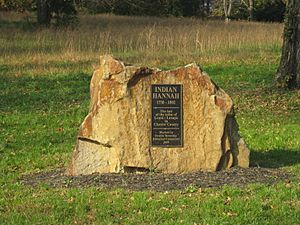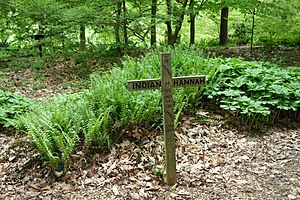Hannah Freeman facts for kids
Quick facts for kids
Hannah Freeman
|
|
|---|---|
| Born | March 1731 Newlin Township, Chester County, Pennsylvania
|
| Died | March 20, 1802 |
| Other names | Indian Hannah |
| Occupation | Healer, artisan, farmer |
| Known for | Last surviving Lenape in Chester County, Pennsylvania |
Hannah Freeman (born March 1731 – died March 20, 1802) was an important Lenape woman. She was also known as "Indian Hannah." She was a skilled healer, artist, and farmer. Many people believed she was the last Lenape person living in Chester County, Pennsylvania.
Contents
Hannah Freeman's Life Story
Early Life and Skills
Hannah Freeman was born in March 1731. Her home was a log cabin near Brandywine Creek. This land was part of her Lenape ancestors' home. It was later claimed by a Quaker man named William Webb. Today, this area is known as Longwood Gardens.
Hannah grew up in a close family. She lived with her grandmother, mother, and aunts. When she was young, her father moved away. He went to Shamokin to escape the many new settlers.
Hannah learned both English and her native Unami language. She was very talented. She made money by spinning thread, sewing clothes, and weaving baskets. She also made brooms. Hannah worked for Quaker farmers nearby.
A Healer and Farmer
Hannah was known for her healing skills. She knew a lot about plants. She used them to help sick people get better. Besides healing, she also farmed. She grew corn and vegetables. She caught fish and turtles. She even raised cows and pigs.
Hannah often traveled with her two dogs, Elmun and Putmoe. It is thought she might have had a husband named Andrew Freeman. However, not much is known about him. There is no proof that Hannah had any children.
Moving for Safety
In 1758, Hannah moved to Chester Creek. She stayed with relatives there. This was to avoid fighting during the French and Indian War. She returned home a year later.
In 1764, Hannah and her family had to leave again. They went to Woodbury, New Jersey. This was to escape a group called the Paxton Boys. This group had attacked a peaceful Native American community nearby. Hannah and her family lived in New Jersey for seven years. Then they came back to their homeland near the Brandywine.
Sometimes, Hannah lived in a summer cabin in Centreville, Delaware. She continued her work there. She traded goods and farmed on a small scale.
Later Years and Challenges
As Hannah got older, she faced sadness. She lost many of the women in her family. Her grandmother Jane died in 1775. Her aunt Betty died in 1780. Her mother Sarah passed away in 1785. Her aunt Nanny died soon after.
In the 1790s, Hannah's health got worse. She had rheumatoid arthritis and other sicknesses. She could no longer farm or travel much. She began living with different Quaker neighbors. They gave her a place to stay and food. In return, she worked as much as she could.
In 1797, Hannah was officially declared unable to support herself. In 1798, 34 Quaker neighbors helped her. They made a promise to care for her. They called this promise "Kindness Extended."
On November 12, 1800, Hannah went to the new Chester County Alms House. This was a place for people who needed help. She died there on March 20, 1802. Hannah wanted to be buried in an old Native American cemetery. But she was buried in the first grave behind the poorhouse instead.
Hannah Freeman's Lasting Impact
The Last Lenape?
In 1800, Hannah's neighbors said she was "the only person of that description left among us." This meant they thought she was the last Lenape person in the area. These Quaker neighbors had settled on land that the Lenape people had never sold.
Because Hannah was believed to be the last Lenape, her death was used to justify land claims. It seemed to fulfill an old promise. This promise said the land belonged to the Lenape until the last one left. Hannah's travels also seemed to suggest the Lenape did not own the land. As of 2021, Pennsylvania has no official Native American reservations. It also has no tribes recognized by the government.
Memorials and Legacy
There are no photos or drawings of Hannah Freeman. But she is remembered in other ways. A road in Newlin Township is named after her: "Indian Hannah Road."
There are also two memorial markers for her. One was put up in 1925. It is a bronze plaque on a large rock. It marks her birthplace. This marker is on Pennsylvania Route 52. Another bronze plaque marks her gravesite. It was placed in 1909.
Longwood Gardens has a simple cross dedicated to Hannah Freeman. This tradition was started by a past owner of the property.
The "Indian Hannah" Bean
Hannah Freeman saved a special bean. Her Lenape people traditionally grew this bean. It was part of a farming method called the Three Sisters. This method grows corn, beans, and squash together. The bean was named "Indian Hannah" in her honor. As of 2022, this bean is still grown by a farm called Truelove Seeds.
Two baskets that Hannah reportedly made are kept today. They are in the collections of the Chester County History Center.
 | Georgia Louise Harris Brown |
 | Julian Abele |
 | Norma Merrick Sklarek |
 | William Sidney Pittman |



